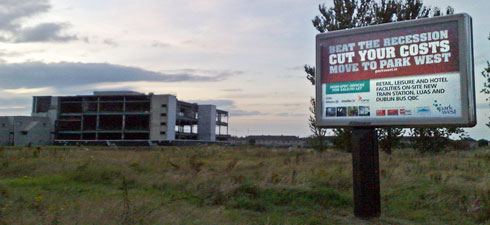Celtic Tiger to Celtic Tories would seem an apt way of summing up the story of Ireland in recent times. From poster child of free-market globalisation everywhere from Hungary to Honduras, the UK's nearest neighbour is now enforcing the most savage cuts in public-sector pay, child benefits and social welfare payments of any EU government. Such is the level of misery being endured by the increasingly bewildered citizens of this little republic that even Brian Lenihan, the man principally responsible for inflicting it, has publicly acknowledged that fellow Europeans are "amazed at our capacity to take pain". The finance minister added, slightly boastfully: "In France there would be riots if you tried to do this."
Lenihan's last budget, delivered shortly before Christmas, was so draconian that the Daily Telegraph took to hailing him as a role model for the British Chancellor. Inevitably, this led to him being branded "Iron Brian" back home, though he will doubtless be spared Margaret Thatcher-style demonisation as he has since been diagnosed with pancreatic cancer.
Instead, the nickname will probably now be pinned on the premier, Brian Cowen, who has responded to the current crisis pretty much as David Cameron and George Osborne advocate. Alone among the leaders of advanced industrial nations, Ireland's two Iron Brians rejected the Keynesian case for a fiscal stimulus to keep the economy moving and set about inflicting a scale of pain from which even the new Tories might flinch momentarily.
Since the onset of the credit crunch in mid-2008, Dublin has delivered three slash-and-burn budgets estimated to have sucked about 5 per cent out of the nation's GDP. Exacerbating rather than alleviating the rapid meltdown in its private sector, such retrenchment could contribute to an astonishing 15 per cent shrinkage in the Irish economy overall - the sharpest contraction experienced by any advanced industrial nation in peacetime. Read full article in the New Statesman...
Banking crisis
Governments reluctant to hold open inquiries
After months of public pressure, the Irish government has announced its intention to hold an inquiry into the meltdown of Ireland’s banking sector in 2008, reports the Irish Independent. The banking crisis that led to the nationalisation of Anglo-Irish and the recapitalisation of other banks has lumbered the Irish public with an estimated €30 billion for Anglo-Irish alone. And if worries about Ireland’s colossal €75 billion national debt are not enough, the Sunday Independent has reported that it is set to soar to double the figure by 2014. This is further compounded by the Treasury’s continued inability to raise taxes, “down since 2007, from a peak of €47.3bn to just €33bn last year.” “As a result,” the daily notes, “in a devastating realisation of the country's woeful financial position, one-fifth of all taxes raised will have to go just to pay off interest on the debt mountain.”
The public mood may further sour, however, with reports that Taoiseach Brian Cowen is reluctant to hold the inquiry in public. A similar governmental reluctance for total disclosure may be detected in the Netherlands, with Amsterdam daily Trouw reporting that the first hearings taking place 18th January by the Dutch commission into own banking crisis are neither compulsory nor under oath. The commission intends to look into Dutch state support for banks like ING (€ 10 billion), AEGON (€ 3 billion) and SNS Reaal (€ 750 million). According to the Netherlands Bureau for Economic Policy Analysis, the Dutch economy shrunk by 4.75% in 2009.
Was this article useful? If so we are delighted!
It is freely available because we believe that the right to free and independent information is essential for democracy. But this right is not guaranteed forever, and independence comes at a cost. We need your support in order to continue publishing independent, multilingual news for all Europeans.
Discover our subscription offers and their exclusive benefits and become a member of our community now!












